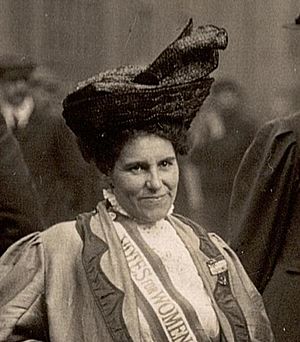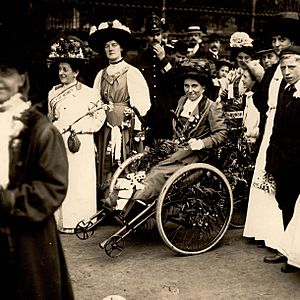Rosa May Billinghurst facts for kids
Quick facts for kids
Rosa May Billinghurst
|
|
|---|---|

Billinghurst participating in a demonstration
|
|
| Born | 31 May 1875 |
| Died | 29 July 1953 (aged 78) Twickenham, Middlesex, England
|
| Nationality | British |
| Occupation | Social worker and teacher |
| Known for | Suffragette activities |
| Children | 1 |
Rosa May Billinghurst (born May 31, 1875 – died July 29, 1953) was a brave British activist who fought for women's right to vote. She was a "suffragette," which means she believed women should have the same voting rights as men. She was well-known for campaigning while using a special tricycle because she couldn't walk easily.
Contents
Early Life and Challenges
Rosa May Billinghurst was born in 1875 in Lewisham, London. She was one of nine children. Her mother's family made pianos, and her father was a banker.
When she was a child, Rosa got a serious illness called polio. This illness made it very hard for her to walk. She used special leg braces and either crutches or a modified tricycle to get around. Despite this, she became very active in helping others. She did social work at a place called a workhouse in Greenwich and taught at a Sunday School. She also joined a group called the Band of Hope, which promoted healthy living.
Fighting for Women's Rights
Rosa was very involved in politics. She first joined a group called the Women's Liberal Association. Later, in 1907, she became a member of the Women's Social and Political Union (WSPU). This was a leading group fighting for women's right to vote.
Joining the Suffragette Movement
Rosa took part in a big WSPU march to the Royal Albert Hall in June 1908. She also helped the WSPU during an election in Haggerston in July 1908. On election day, many suffragettes were released from prison and went to campaign.
Rosa was known for her unique way of protesting. She used her adapted tricycle to get close to protests. Once, she was seen distracting a police horse, which led to an officer falling. She was then arrested and roughly put into a police van.
Leading the Greenwich Branch
Two years later, Rosa started the Greenwich branch of the WSPU. As its first secretary, she joined the famous 'Black Friday' demonstrations in 1910. During this protest, police tipped her out of her tricycle and arrested her. Rosa knew that this made her helpless, but she was willing to face it to get more attention for the cause. Sometimes, police would even let the air out of her tires and take the valves, leaving her stranded.
In 1911, Rosa managed to get very close to the House of Commons with her 'Votes for Women' banner. Police didn't try to stop her tricycle during the rush. She is also thought to have avoided the 1911 census. Many suffragettes boycotted the census to protest not having the right to vote.
Rosa would sometimes place her crutches on both sides of her tricycle and charge towards any opposition. She was arrested many times for her activism.
Protests and Imprisonment
In March 1912, Rosa worked with another suffragette, Janie Allan, during a campaign where windows were broken. Rosa reportedly hid stones under the rug covering her knees. Her first time in Holloway Prison was for breaking a window on Henrietta Street. She was sentenced to one month of hard labor. The prison was unsure how to make her do hard labor because of her disability, so she didn't get extra work. She made friends with other prisoners, including Dr. Alice Stewart Ker. When Rosa was released, she secretly carried a letter out for Dr. Ker's daughter.
On January 8, 1913, Rosa was tried and sentenced to eight months in Holloway Prison for damaging letters in a postbox. She spoke for herself in court, explaining why women should have the right to vote. Her speech, called "The Guilt Lies on the Shoulders of the Government," was published in The Suffragette newspaper.
While in prison, Rosa went on a hunger strike, refusing to eat. She was then force-fed, a very difficult and painful process. She became so ill that she was released just two weeks after the force-feeding began. For her bravery during the hunger strike, Rosa was given a special Hunger Strike Medal 'for Valour'.
Later Activism
Rosa continued her activism after her release. She spoke at a public meeting in West Hampstead in March 1913. On May 24, she chained herself to the gates of Buckingham Palace. On June 14, she rode her tricycle, dressed in white, in the funeral procession for Emily Davison, a suffragette who died for the cause.
On May 21, 1914, Rosa also joined a large group of suffragettes trying to give a petition to King George V. She was not arrested, but two policemen deliberately tipped her out of her tricycle. Another suffragette, Charlotte Drake, had to help her back into it.
When World War I began, Rosa supported the Pankhurst family's decision to focus on the war effort instead of the fight for women's rights. She helped Christabel Pankhurst in her election campaign in 1918. However, Rosa also joined the Women's Freedom League and later the Suffragette Fellowship, continuing to support women's causes. She supported a fund for a film about equal pay.
Rosa stopped her active campaigning for women's suffrage after the Parliament (Qualification of Women) Act 1918 gave some women the right to vote. She later attended the funeral of Emmeline Pankhurst and the unveiling of Emmeline's statue in 1930.
Personal Life
In 1911, Rosa lived with her parents in Lewisham. She later lived in a garden house called "Minikoi" in Sunbury-on-Thames with her adopted daughter, Beth. Beth has written a book about her relationship with her adoptive mother. Rosa also lived with her brother, Alfred John Billinghurst, who was an artist, after 1914.
Death and Legacy
Rosa May Billinghurst passed away on July 29, 1953, at a hospital in Twickenham. She chose to donate her body to science.
Rosa's name and picture are honored on the plinth (the base) of the statue of Millicent Fawcett in Parliament Square, London. This statue, unveiled in 2018, celebrates women who fought for the right to vote.
The important papers and records of Rosa May Billinghurst are kept at The Women's Library at the London School of Economics.
See also
 In Spanish: Rosa May Billinghurst para niños
In Spanish: Rosa May Billinghurst para niños
 | Kyle Baker |
 | Joseph Yoakum |
 | Laura Wheeler Waring |
 | Henry Ossawa Tanner |


